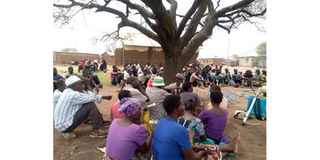Prime
Experts call for measures to bridge regional economic divide in Tanzania

Simiyu residents in a past community baraza. The region is one of the least developed in Tanzania.
What you need to know:
- A recent report by the Bank of Tanzania (BoT) shows that Tabora, Dodoma, Coast, Singida, Kagera and Simiyu continue to lag behind economically, with incomes well below the national average of Sh3,058,847 per person in 2023
Dar es Salaam. Financial experts have urged the government to take deliberate steps and make strategic investments to address economic inequality in six of Tanzania’s poorest regions by income per capita.
A recent report by the Bank of Tanzania (BoT) shows that Tabora, Dodoma, Coast, Singida, Kagera and Simiyu continue to lag behind economically, with incomes well below the national average of Sh3,058,847 per person in 2023.
According to BoT’s 2024 Zonal Economic Performance Report, Tabora recorded Sh1,991,241 per person, Dodoma Sh1,901,444, Coast Sh1,831,545, Singida Sh1,710,562, Kagera Sh1,559,882, and Simiyu Sh1,551,548.
The report attributes the low performance to over-reliance on agriculture and livestock, limited industrial activity and inadequate infrastructure.
In Simiyu, for instance, only 24 percent of farmland is irrigated, making agriculture vulnerable to climate shocks.
The region mainly produces cotton, groundnuts and livestock, but suffers from low productivity and limited processing facilities.
Singida faces similar challenges, depending largely on maize and groundnuts, but with little diversification or value addition.
University of Dar es Salaam lecturer Dr Abel Kinyondo said Tanzania must prioritise industrial investment in underperforming regions.
“We must stop transporting raw materials to Dar es Salaam for processing,” he said.
“A coffee plant in Kagera should process locally. No country develops without industrialisation.”
He added that connecting these regions to major markets, especially Dar es Salaam, would boost local economies.
However, he stressed that political will was crucial.
Financial analyst Oscar Mkude said agriculture must be protected and modernised, calling for more irrigation schemes and support for mining and agro-processing.
“Improved roads, electricity and water systems would help farmers access markets and raise productivity,” he said.
Reacting to the BoT report, Coast Regional Commissioner Abubakar Kunenge said the region has made significant strides under President Samia Suluhu Hassan.
“Industries have grown from 1,387 to 1,681. Large industries rose from 59 to 97, and medium industries from 109 to 181,” he said.
He added that the region contributes significantly to tax revenues and said the National Bureau of Statistics and BoT are reviewing GDP data to reflect ongoing developments.
Singida Regional Commissioner Halima Dendego also cited progress, saying that annual agricultural output had doubled from 650,000 to 1.3 million tonnes.
She noted that smart farming and improved marketing through warehouse receipt systems had increased efficiency.
“We now know crop volumes and prices in real time,” she said.
She also highlighted a rise in livestock and fish production, growth in gold sales, and an increase in large industries from one to nine.
However, regional commissioners from Tabora, Dodoma, Kagera and Simiyu could not be reached for comment.
Experts agree that sustained investment in industry, transport and basic infrastructure is key to unlocking the potential of these lagging regions.


